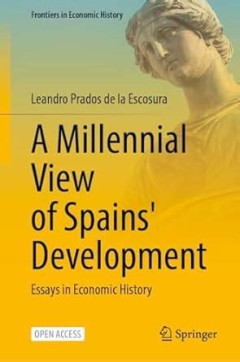Filter by

Japan’s Arduous Rejuvenation as a Global Power = Democratic Resilience and …
This open access book assesses the profound impact of Japan’s aspirations to become a great power on Japanese security, democracy and foreign relations. Rather than viewing the process of normalization and rejuvenation as two decades of remilitarization in face of rapidly changing strategic environment and domestic political circumstances, this volume contextualizes Japan’s contemporary in…
- Edition
- 1
- ISBN/ISSN
- 9789811361906
- Collation
- XIII, 242 ill; lamp
- Series Title
- -
- Call Number
- -

The Biopsychosocial Model of Health and Disease = New Philosophical and Scien…
This open access book is a systematic update of the philosophical and scientific foundations of the biopsychosocial model of health, disease and healthcare. First proposed by George Engel 40 years ago, the Biopsychosocial Model is much cited in healthcare settings worldwide, but has been increasingly criticised for being vague, lacking in content, and in need of reworking in the light of recent…
- Edition
- 1
- ISBN/ISSN
- 9783030118990
- Collation
- XIII, 149 ill; lamp
- Series Title
- -
- Call Number
- -

Gathering Souls: Jesuit Missions and Missionaries in Oceania (1668–1945) : …
This essay deals with the missionary work of the Society of Jesus in today’s Micronesia from the seventeenth to the twentieth century. Although the Jesuit missionaries wanted to reach Japan and other Pacific islands, such as the Palau and Caroline archipelagos, the crown encouraged them to stay in the Marianas until 1769 (when the Society of Jesus was expelled from the Philippines) to evangel…
- Edition
- -
- ISBN/ISSN
- 978-90-04-39487-2
- Collation
- -
- Series Title
- Brill Research Perspectives in Jesuit Studies
- Call Number
- -

Ceramics and the Spanish Conquest: Response and Continuity of Indigenous Pott…
The Spanish colonization dramatically interrupted the autonomous development of ancient Mesoamerican culture. Nevertheless, indigenous societies learnt to live with the conquest. It was not only a time of crisis, but also an extraordinarily creative time period in which material culture reflected indigenous peoples’ varied responses and adaptations to the changing circumstances. This work pre…
- Edition
- Volume: 2
- ISBN/ISSN
- 978-90-04-21745-4
- Collation
- -
- Series Title
- -
- Call Number
- -

Chains of Gold; Portuguese Migration to Argentina in Transatlantic Perspective
Why did migrants from southern Portugal choose Argentina instead of following the traditional path to Brazil? Starting with this question, this book explores how, at the turn of the twentieth century, rural Europeans developed distinctive circuits of transatlantic labor migration linked to diverse immigrant communities in the Americas. It looks at transoceanic moves in the larger context of mig…
- Edition
- Volume: 2
- ISBN/ISSN
- 978-90-47-42992-0
- Collation
- -
- Series Title
- -
- Call Number
- -

A Millennial View of Spain’s Development = Essays in Economic History
This open access book presents the evolution of the Spanish economy over the past seven centuries since the end of the Reconquest and examines how much economic progress has Spain achieved, as well as its impact on living standards and income distribution over the very long run. It shows that preindustrial Spain was far from stagnant, although levels of output per head in the early nineteenth c…
- Edition
- 1
- ISBN/ISSN
- 9783031607929
- Collation
- XXXII, 375 hlm; ill., lamp.,
- Series Title
- -
- Call Number
- -

Artistic Disobedience: Music and Confession in Switzerland, 1648–1762
In Artistic Disobedience Claudio Bacciagaluppi shows how music practice was an occasion for cross-confessional contacts in 17th- and 18th-century Switzerland, implying religious toleration. The difference between public and private performing contexts, each with a distinct repertoire, appears to be of paramount importance. Confessional barriers were overcome in an individual, private perspectiv…
- Edition
- -
- ISBN/ISSN
- 978-90-04-33075-7
- Collation
- -
- Series Title
- -
- Call Number
- -

Data Journeys in the Sciences
This groundbreaking, open access volume analyses and compares data practices across several fields through the analysis of specific cases of data journeys. It brings together leading scholars in the philosophy, history and social studies of science to achieve two goals: tracking the travel of data across different spaces, times and domains of research practice; and documenting how such journeys…
- Edition
- 1
- ISBN/ISSN
- 9783030371777
- Collation
- XVII, 412 hlm; ill., lamp.,
- Series Title
- -
- Call Number
- -

Art Crossing Borders: The Internationalisation of the Art Market in the Age o…
Art Crossing Borders offers a thought-provoking analysis of the internationalisation of the art market during the long nineteenth century. Twelve experts, dealing with a wide variety of geographical, temporal, and commercial contexts, explore how the gradual integration of art markets structurally depended on the simultaneous rise of nationalist modes of thinking, in unexpected and ambiguous wa…
- Edition
- Volume: 6
- ISBN/ISSN
- 978-90-04-29199-7
- Collation
- -
- Series Title
- -
- Call Number
- -

Arnold Geulincx Ethics: With Samuel Beckett's Notes
Arnold Geulincx (1624-1669) is a key figure in the history of ideas, whose concepts have been seen as precursors to those developed by Spinoza, Malebranche, Leibniz and Kant. His Ethics presents a treatment of virtue from the standpoint of occasionalist metaphysics. The great Irish writer Samuel Beckett stated that Geulincx, with his emphasis on the powerlessness and ignorance of the human con…
- Edition
- Volume: 146/1
- ISBN/ISSN
- 978-90-47-41138-3
- Collation
- -
- Series Title
- -
- Call Number
- -
 Computer Science, Information & General Works
Computer Science, Information & General Works  Philosophy & Psychology
Philosophy & Psychology  Religion
Religion  Social Sciences
Social Sciences  Language
Language  Pure Science
Pure Science  Applied Sciences
Applied Sciences  Art & Recreation
Art & Recreation  Literature
Literature  History & Geography
History & Geography